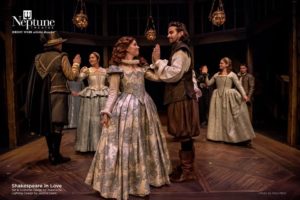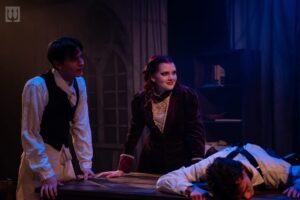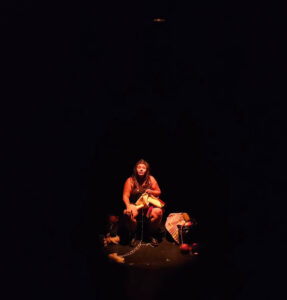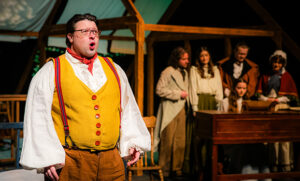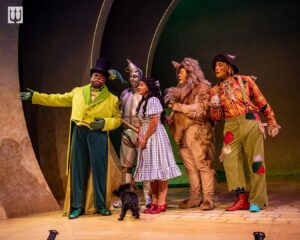allister macdonald, sarah english & cast. photo by stoo metz
The first time I remember attending a show at Neptune Theatre was in 1994. I was nine. It was not my first time seeing a show there, but it’s the first one I remember vividly. I’ve kept coming back throughout the years because I love Halifax, and I love theatre, and Neptune is Halifax’s theatre. The first thing I noticed on Friday evening at the Opening Night performance of Shakespeare In Love, the beginning of the theatre’s 56th season, was that there was something different in the air: a communal sense of excitement, a palpable rejoicing, before the play had even started. In his Artistic Director’s Message Jeremy Webb speaks to the audience, to his fellow Haligonians, and he refers to Neptune as “your theatre.” Our theatre. I encourage everyone in our city, in our community, to come out and see this wonderful production of Shakespeare In Love that has been brought forth by a cast and creative team entirely made up of Nova Scotian artists. I think you will leave feeling very proud that Neptune is our theatre. I certainly did.
The play, adapted by Lee Hall, is based on the film Shakespeare In Love (1998), which imagines a narrative for William Shakespeare during his “lost years,” the time between when his twins were born in 1585 and when he appears in historical records as part of London’s theatre scene in 1592. The story begins with Will (Allister MacDonald) suffering from writer’s block and promising his unwritten play to both Philip Henslowe (Marty Burt), who owns the Rose Theatre and Richard Burbage (Simon Henderson), who owns the Curtain Theatre. Henslowe is in deep debt to a terrifying moneylender named Fennyman (Jim Fowler) and is relying on Will’s new play to literally allow him to keep his nose and his ears. Meanwhile, Viola de Lesseps (Sarah English), the daughter of a wealthy merchant, has been visiting the playhouse and knows all the words to Will’s play by heart. She hears about auditions for a new Shakespeare play at the Rose and defies the Elizabethan rule that bans women from the stage, disguising herself as “Thomas Kent.” She impresses everyone with her incredibly nuanced acting prowess. Shakespeare casts “Thomas Kent” as Romeo in the play that slowly evolves into Romeo and Juliet, while at the same time, he also falls in love with Viola. Things become even more complicated when Viola becomes engaged to the lecherous Wessex (Kevin Curran). Chaos ensues.
MacDonald’s Will Shakespeare oscillates beautifully between the quiet contemplation, sense of self-doubt and speechlessness inherent both in the creation of new work and the discovery of new love, and the strong sense of self, purpose, confidence, and excitement he has when at the theatre advocating for his own artistic vision and business interests. This shows us a side to Will that is very human, from whence his emotional poetry flows, and also a side that suggests the dedication, focus, and nerve needed to accomplish incredible things in a very short period of time. Similarly, English’s Viola lives beautifully on the margins of what is acceptable for a woman in the late 16th Century. She exhibits agency, drive, bravery, ingenuity and confidence in her opinions and ability, and yet also retreats seamlessly into grace, poise and a sense of modesty when it is needed for self preservation. In “Thomas Kent” English’s Viola is given the freedom to move beyond these margins and English gives a very nuanced meta-theatrical performance of how her character adapts to the new rules afforded to her as “Thomas Kent.”
Although the crux of the story is centred very much on Will and Viola, the play is deeply rooted in its ensemble and Webb has assembled a uniformly wonderful cast of actors. The cast of Romeo and Juliet in the play is a historically accurate melange of men from various trades, suggesting they are the inspiration for the mechanicals in Shakespeare’s later A Midsummer Night’s Dream. Andrew Chandler shines in the role of Romeo and Juliet’s Nurse. Kevin Curran gives a delightfully silly performance as Valentine/Peter/Tybalt that is made richer by the comparison to his wholly villainous Wessex. Josh MacDonald gives a beautifully triumphant performance as Wabash overcoming a nervous stutter. This is also a complement to his pompous Sir Edmund Tilney, who is intent on implementing Her Majesty’s censorship laws at the theatre. Wayne Burns gives a lovely portrayal of Sam, the “boy actress” cast as Juliet, who takes his job very seriously and looks up to the talented “Thomas Kent.” Burns also plays Christopher “Kit” Marlowe, Will’s friend and a fellow playwright, who gives Shakespeare some of his more inspired ideas, and who moves about the world with reckless abandon and a sense of mystery. Jacob Sampson is Ned Alleyn, the man considered to be the foremost actor of his time. Sampson dramatizes well the conflict in Alleyn between wanting to serve himself, and be the star, and wanting to serve the work. There were no directors in Elizabethan drama, so we see Alleyn taking on the leadership role of “master actor” with the rest of the mechanicals, which is one of the small details that really roots this fictional story in historical realism. Simon Henderson finds lots of fun opportunities for comedy in portraying Burbage, which is countered perfectly by Marty Burt’s portrayal of the much put upon Henslowe. Jim Fowler’s Fennyman goes from biting to earnest to great comic effect.
Susan Stackhouse plays Viola’s nurse, the obvious inspiration for the Nurse in Romeo and Juliet, and the relationship that Stackhouse and English create is one of the most beautiful in the play. In showing the genuine love, loyalty and mutual respect between the Nurse and Viola in “real life”, it highlights the hollowness of these two characters in Romeo and Juliet, especially when they are both played by men, but also, I would argue, in many contemporary productions of the play where the Nurse is often played only for laughs. This makes Viola’s case for why women were needed so drastically on the Elizabethan stage. Jennie Raymond returns to Neptune Theatre to play Queen Elizabeth I and she is absolutely perfect at delivering her acerbic wit, and capturing the unwavering strength and sense of her own power that could only come to a woman at that time from having been the Queen of England for more than thirty years. After every line that Raymond speaks, there is an implied imaginary microphone drop.
Mary Lou Martin choreographs some lovely Elizabethan style dancing, from whence Will gets the idea for the ball where Romeo and Juliet first meet. Joanna Yu’s set and costume design are both flawless in rooting the play immediately in its proper place and time, and giving the actors, and their director, lots of different elements to play with. Karen Bassett gives us some of the most inventive and fun fight choreography I have ever seen, and Jessica Lewis’ lighting design gives us a good sense of a world entirely at the mercy of daylight or candlelight. Then, of course, there is the bit with the dog. Missy, who plays Spot, is so cute and well trained, you sort of wish Henslowe had convinced Will that Romeo and Juliet was in drastic need of a dog.
Director Jeremy Webb creates so much space for his actors to play, he finds the silliness, and captures the sense of fun, optimism and magic that we hope is inherent in the creation of a new play. He also encourages the more nuanced and emotional moments, like those between English and Stackhouse, and those between MacDonald and English, and he isn’t afraid to allow Curran to make Wessex a very dark cloud hanging over the head of a very brightly shining light. Viola is very much the hero of this play, but she is also confined to the realities of a cruel and misogynistic world. Her story ends in both victory and defeat simultaneously.
Shakespeare In Love is a love letter to the theatre for sure; it’s a nod to our theatrical ancestors: Shakespeare, Marlowe, Burbage and Alleyn. It’s also a nod to the space held by Viola, by “Thomas Kent,” who we are aware needs to be fictionalized because of the failure of the patriarchy to both include women in this industry and to include their contributions, their participations and their existence in historical records about the theatre from the time. Viola is an acknowledgement of all that we don’t know, and also a promise to find more ways to tell her stories, regardless of how much fact is missing, today and into the future.
Jeremy Webb writes that this play was the first that he chose for his inaugural full season as Artistic Director, and it could not be more apt. The actors in Romeo and Juliet find themselves breaking with tradition, boldly being pushed into the future, and rising triumphantly to the occasion. There’s a feeling of triumph in the building now, a feeling that something new and exciting is happening, but there is also a knowledge that it’s more rooted in our tradition, and with a better awareness of our own theatrical ancestors.
Suddenly, our theatre feels like home.
Shakespeare In Love plays at Neptune Theatre’s Fountain Hall Stage (1593 Argyle Street). The show runs until October 7th. Shows are at 7:30pm on Tuesday to Friday and 2:00pm and 7:30pm on Saturdays and Sundays. Industry Night is September 11th, Talkback Night is September 12th and Relaxed Performance is September 23rd. For tickets and/or more information please CLICK HERE, Call 902-429-7070 or 1-800-565-7345 or visit the Box Office at 1593 Argyle Street.
Follow Neptune Theatre on Social Media: Facebook. Twitter. Instagram (@NeptuneTheatre). Use #HfxInLove to help spread the word about the show.

